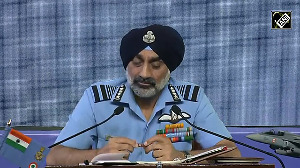The Indian government is expected to release on Thursday or Friday the text of 123 Agreement finalised between India and the United States to operationalise the civil nuclear deal.
According to sources in the Ministry of External Affairs, the text will be simultaneously released in Washington and New Delhi.
The agreement which Undersecretary of State for Political Affairs Nicholas Burns termed as, "perhaps the single most important initiative that India and the United States have agreed to in the 60 years of our relationship" has vertically divided opinion in both countries.
Both governments have finalised the highly controversial deal on July 20, 2007, in Washington but, for some curious reasons, are reluctant to release the text.
It's believed that Indian government wanted their own understanding and contexts of the 123 Agreement to spread before the criticism could build up in the media.
Also, the government wanted to brief the Left parties and the Bharatiya Janta Party before Prime Minister Manmohan Singh tables the deal in the Parliament.
But, both left parties and BJP who have been opposing the deal didn't reject or accept the government's position on the deal and preferred to wait for the text.
As a result Dr Singh could not even proceed to develop some sort of consensus within Indian political establishment. Rather, the statements made by Burns in Washington on 27, July (https://www.state.gov/p/us/rm/2007/89559.htm) has upset the government's stated position in on the record and off the record briefings on the 123 Agreement.
The sources in MEA claims that the reprocessing agreement is being separately done and the mention of the future nuclear test is absent from the 123 Agreement but still the government will have to respond to Burns' arguments.
Burns has made so far eight trips to India and both sides took two years and two days to negotiate the deal.
It is expected that the radical deal will have far reaching impact on India's foreign policy, nuclear ambitions, strategic thinking and its position in South Asia and on the global trade of India, particularly in the sector of the dual use of the high technology.
From the government side the argument goes that in all the nitty-gritty reporting on 123 Agreement and nuclear deal, most people are missing the wood for the trees. This week the global order has been changed.
Irrespective of the fate of the 123 Agreement and the stand the Nuclear Suppliers Group takes, India has a new status.
At some (huge cost, critics say) cost India will get out of the sanctions regime and India will get uninterrupted supply of nuclear fuel so crucial to expand the nuclear energy sector.
The joint press conference addressed by National Security Advisor M K Narayanan, Chairman of the Atomic Energy Commission Anil Kakodkar and Foreign Secretary Shiv Shankar Menon on July 27 failed to bring out any such euphoria when grilled by the media.
Rather, Kakodkar, the government's trump card to give credibility to the deal, avoided all the vital issues.
He was ultra-cautious most times and didn't give any indication that he was celebrating a breakthrough, as claimed by government, in India's nuclear history.
This is what rediff.com asked him in the joint press conference: "Dr Kakodkar, we do not know much about your department. But we would like to know how jubilant your scientists are or what is the exact reaction of the scientists. Are they celebrating or not? Secondly, can you explain in layman's language how radical this moment is for you and the scientists of India? And I would like to know what you have not got that the nuclear weapon states have got?"
The pragmatic Dr Kakodkar said, "I think we are all karmayogis. So, we just carry the work on and this will allow us to remain consistent with that philosophy in an expanded manner."
"You have not answered that question, "What is it that you could have got?" persisted another senior reporter.
Kakodkar merely said, "I think the NSA (Narayanan) responded to that right in the beginning. I can have a huge wish list, but that is not the point. The point is with what objective we set out in July 18, 2005, and whether we are consistent with that.
And the answer is yes."
The Indian side may be tight-lipped or extra-alert but critics of the deal say Burns' statement of July 27 has all that the Indian side would like to hide.
The Left parties and the BJP have been discussing within the party forum about Burns' statement and what the PMO has briefed them.
Burns' statement regarding future nuclear tests is terse and clear. He has said that if India conducted a nuclear test, or if "there is ever any reason for the United States to have to invoke the right-of-return, [of nuclear fuel and technology] we could certainly do so."
Importantly, Burns has said in his statement, "Our two countries will also subsequently agree on a set of arrangements and procedures under which reprocessing will take place. And for those of you who are steeped in this, you know that's called for by Section 131 of the Atomic Energy Act of 1954."
Dr A N Prasad who has been severe critic of the deal from the beginning said the conditions under Section 131 of the Atomic Energy Act of 1954 are too stringent and it will be difficult for India to follow.





